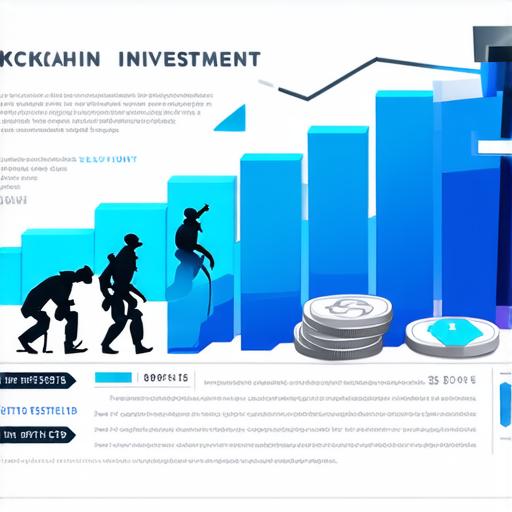The Evolution of Blockchain Investment
Investment in blockchain can be traced back to its early days when it was just a theoretical concept. However, with the launch of Bitcoin, the first decentralized cryptocurrency, blockchain investment gained momentum.
As more people became aware of Bitcoin’s potential, they started investing in it, leading to a significant increase in the value of this digital currency.
The popularity of Bitcoin led to the creation of other cryptocurrencies such as Ethereum, Ripple, and Litecoin, among others. These cryptocurrencies have since become widely adopted and are being used for various purposes, including cross-border payments, supply chain management, and voting systems.
The Increase in Blockchain Investment
In recent years, blockchain investment has seen an unprecedented increase, with billions of dollars being poured into this technology. According to a report by Hampleton Partners, the global blockchain market is expected to reach $39 billion by 2025, growing at a compound annual growth rate (CAGR) of 84.7% from 2019 to 2025.
The Benefits of Blockchain Investment
Blockchain investment offers several benefits, including security, transparency, and decentralization. These features have made blockchain technology ideal for applications such as supply chain management, voting systems, and identity verification.
For example, in the healthcare industry, blockchain technology is being used to create secure patient records that are tamper-proof and can only be accessed by authorized personnel. This has significantly reduced the risk of medical errors and fraud, making healthcare more efficient and effective.
The Impact of Regulation on Blockchain Investment
Despite the benefits of blockchain technology, its adoption has been hindered by regulation in some countries. In China, for example, the government has banned initial coin offerings (ICOs), leading to a significant decrease in investment in this country. However, other countries such as Switzerland and Estonia have embraced blockchain technology and have created regulatory frameworks that encourage investment.
The Future of Blockchain Investment
The future of blockchain investment is bright, with many experts predicting continued growth in this sector. According to a report by MarketsandMarkets, the global blockchain market is expected to reach $39 billion by 2025, growing at a CAGR of 84.7% from 2019 to 2025.
As more industries adopt blockchain technology, the demand for blockchain-related products and services will continue to increase, leading to more investment in this sector. Additionally, as regulators create more favorable regulatory frameworks, the adoption of blockchain technology will become even more widespread, further driving investment in this sector.
Case Studies: Real-Life Examples of Blockchain Investment
To better understand the impact of blockchain investment, let’s look at some real-life examples of how this technology has been used in various industries.

Financial Services:
Banks are now using blockchain technology to create secure payment systems that are faster and more efficient than traditional payment methods. For example, JPMorgan Chase has developed a blockchain-based payment system called Quorum that enables banks to process payments quickly and securely.
Healthcare:
Blockchain technology is being used to create secure patient records that are tamper-proof and can only be accessed by authorized personnel. This has significantly reduced the risk of medical errors and fraud, making healthcare more efficient and effective. For example, MediLedger Project, a nonprofit organization, is developing a blockchain-based system for tracking prescription drugs, reducing opioid abuse, and improving patient safety.
Supply Chain Management:
Blockchain technology is being used to create secure and transparent supply chain systems that enable businesses to track products from production to delivery. This has increased transparency and reduced fraud, making supply chains more efficient and effective. For example, Walmart has partnered with IBM to create a blockchain-based system for tracking food products, enabling consumers to trace the origin of their food and ensure its safety.
Logistics:
Blockchain technology is being used to create secure and transparent logistics systems that enable businesses to track shipments in real-time. This has increased transparency and reduced fraud, making logistics more efficient and effective. For example, Maersk, one of the world’s largest shipping companies, has partnered with IBM to create a blockchain-based system for tracking shipments, enabling businesses to trace their products from port to port.
FAQs: Answering Common Questions About Blockchain Investment
Q: What is blockchain investment?
A: Blockchain investment refers to the financial resources being poured into this technology for various purposes such as creating decentralized applications, funding research and development projects, and investing in startups that use blockchain technology.
Q: How much has been invested in blockchain technology?
A: According to a report by Hampleton Partners, the global blockchain market is expected to reach $39 billion by 2025, growing at a compound annual growth rate (CAGR) of 84.7% from 2019 to 2025.
Q: What are some benefits of blockchain technology?
A: Blockchain technology offers several benefits such as security, transparency, and decentralization, making it ideal for applications such as supply chain management, voting systems, and identity verification.
Q: How has regulation impacted blockchain investment?
A: Regulation in some countries has hindered the adoption of blockchain technology, leading to a decrease in investment. However, other countries have created regulatory frameworks that encourage investment, leading to continued growth in this sector.
Conclusion
Blockchain investment is on the rise, with billions of dollars being poured into this technology for various purposes such as creating decentralized applications, funding research and development projects, and investing in startups that use blockchain technology. As more industries adopt blockchain technology, the demand for blockchain-related products and services will continue to increase, leading to even more investment in this sector. With its numerous benefits, it is clear that blockchain technology will continue to play an important role in shaping the future of finance, healthcare, supply chain management, logistics, and many other industries.
